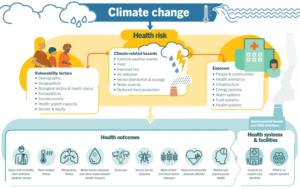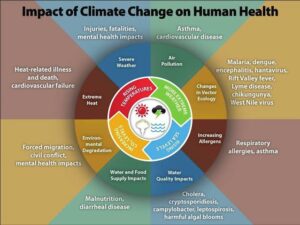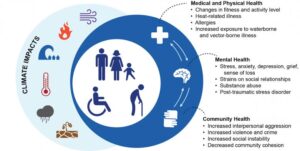Back to: Environmental Biology 100 Level
Welcome to class!
Hello smart learner! Today, we are talking about Climate Change & Public Health, a topic that affects every one of us, no matter where we live. Have you noticed how the weather is becoming hotter, with heavy rains sometimes causing floods or droughts? This is climate change, and it is already affecting our health in many ways. By the end of this lesson, you will understand what climate change is, how it impacts public health, and what we can do to stay safe.
Climate Change & Public Health
Climate change is one of the biggest challenges facing our world today. In Nigeria, we experience heat waves, rising temperatures, unpredictable rains, and even floods in some areas. These changes do not just affect the environment—they also affect our health by increasing the spread of diseases and reducing access to clean water and food.

What is Climate Change?
Climate change is the long-term shift in weather patterns, mainly caused by human activities like burning fossil fuels (petrol, diesel), cutting down trees, and releasing greenhouse gases into the atmosphere.
Causes of Climate Change
Burning of Fossil Fuels: Cars, generators, and industries release carbon dioxide and other gases.
Deforestation: Cutting down trees reduces the natural cooling effect of forests.
Industrial Activities: Factories release harmful gases into the air.

Poor Waste Management: Waste burning releases methane and toxic gases.
What is Public Health?
Public health is the science of protecting the health of communities through disease prevention, clean environments, and good healthcare systems.
Effects of Climate Change on Public Health
Heat-Related Illnesses: Extreme heat causes dehydration, heat stroke, and even death.
Spread of Diseases: Warm temperatures encourage mosquitoes, leading to malaria and yellow fever.
Waterborne Diseases: Floods contaminate water sources, increasing cholera and typhoid outbreaks.
Food Shortages: Irregular rains and droughts reduce crop yields, leading to hunger and malnutrition.
Air Pollution: Smoke from industries and vehicles worsens respiratory problems like asthma.
How to Reduce the Impact of Climate Change on Public Health
Plant more trees to improve air quality and provide shade.
Use renewable energy like solar power instead of generators.

Proper waste disposal and recycling to reduce pollution.
Early warning systems and health campaigns during heat waves or floods.
Encourage walking, cycling, or public transport to reduce car emissions.
Summary
- Climate change is a long-term change in weather patterns caused by human activities.
- It is mainly caused by burning fossil fuels, deforestation, and industrial pollution.
- Public health deals with protecting community health and preventing diseases.
- Climate change leads to heat illnesses, malaria, cholera, and food shortages.
- Planting trees, recycling, and using clean energy help reduce climate change’s effects on health.
Evaluation
- What is climate change?
- Mention two causes of climate change.
- How does climate change affect public health?
- Suggest two solutions for reducing climate change’s impact on health.
- What is public health?
Well done, superstar! By learning about climate change and public health, you are taking steps to protect not only yourself but also your community. Keep believing in yourself—Afrilearn is here to help you grow and shine!
